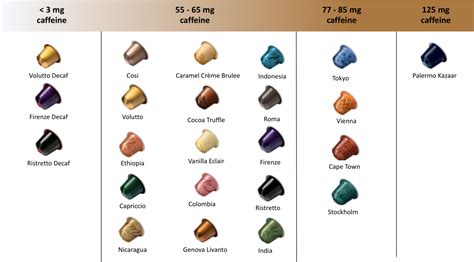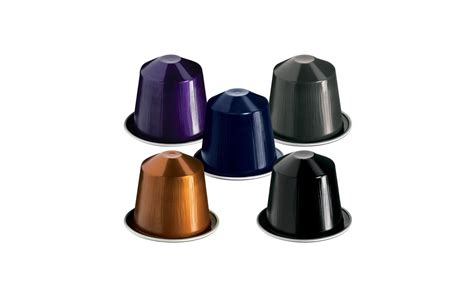Nespresso Caffeine Content

For those who appreciate a strong, flavorful cup of coffee, the Nespresso brand has become a popular choice. The unique brewing system and wide range of capsules offer convenience and variety to coffee enthusiasts. One common concern among coffee lovers is the caffeine content in their brew, especially when it comes to Nespresso capsules. This article aims to delve into the world of Nespresso caffeine content, providing an in-depth analysis to help you make informed choices about your coffee consumption.
Understanding Caffeine in Nespresso Capsules

Caffeine is a natural stimulant found in coffee beans, and its concentration can vary depending on various factors such as the coffee blend, roasting process, and brewing method. Nespresso, with its diverse range of coffee capsules, offers a spectrum of caffeine levels to cater to different preferences and needs.
The Caffeine Spectrum: Nespresso’s Variety
The Nespresso collection is divided into two main categories: Original and Vertuo. Each category offers a selection of capsules with varying caffeine content, from the more caffeinated Intenso blends to the milder Decaffeinato options.
| Nespresso Range | Caffeine Content (mg/capsule) |
|---|---|
| Original: Intenso Blend | 110 - 140 mg |
| Original: Vivace Blend | 80 - 100 mg |
| Original: Decaffeinato Blend | 5 - 10 mg |
| Vertuo: Alto Blend | 130 - 150 mg |
| Vertuo: Lungo Blend | 90 - 110 mg |
| Vertuo: Decaffeinato Blend | 5 - 20 mg |

The above table provides a general guideline, as caffeine content can vary slightly within each blend. Additionally, the serving size (capsule volume) also plays a role in the overall caffeine intake.
Factors Affecting Caffeine Content
Several factors contribute to the caffeine levels in Nespresso capsules:
- Coffee Blend: Different coffee beans have varying natural caffeine content.
- Roasting Process: Lighter roasts tend to retain more caffeine compared to darker roasts.
- Brewing Method: The Nespresso brewing system, with its high pressure and precise extraction, ensures an optimal caffeine extraction.
- Capsule Volume: The amount of coffee in each capsule affects the caffeine concentration.
Comparing Nespresso Caffeine to Other Brands

To put Nespresso’s caffeine content into perspective, let’s compare it with other popular coffee brands and brewing methods.
Single-Serve Coffee Pods
Single-serve coffee pods, like those used in Nespresso machines, often have a higher caffeine content compared to traditional drip coffee. This is primarily due to the concentrated nature of the coffee in the pods and the precise brewing process.
| Brand | Caffeine Content (mg/pod) |
|---|---|
| Nespresso Original (Intenso) | 110 - 140 mg |
| Keurig K-Cup | 75 - 120 mg |
| Nespresso Vertuo (Alto) | 130 - 150 mg |
| Nescafé Dolce Gusto | 60 - 80 mg |
Traditional Brewing Methods
Traditional brewing methods, such as drip coffee or French press, generally yield lower caffeine content per serving due to the dilution effect.
| Brewing Method | Caffeine Content (mg/cup) |
|---|---|
| Nespresso Original (Intenso) | 110 - 140 mg |
| Drip Coffee (8 oz) | 60 - 120 mg |
| French Press (8 oz) | 40 - 80 mg |
It's important to note that these values are approximate and can vary based on the specific coffee beans and brewing parameters.
Health Implications and Caffeine Intake Recommendations
Understanding the caffeine content in your coffee is crucial for managing your daily intake and ensuring it aligns with your health goals and personal tolerance.
Daily Caffeine Intake Guidelines
The recommended daily caffeine intake varies depending on age and health conditions. According to the Food and Drug Administration (FDA), 400 mg of caffeine per day is generally considered safe for healthy adults.
Potential Health Effects of Caffeine
Caffeine is a stimulant that can have both positive and negative effects on the body. It can enhance alertness, improve concentration, and provide a boost of energy. However, excessive caffeine intake may lead to side effects such as:
- Jitteriness
- Insomnia
- Increased heart rate
- Digestive issues
Managing Caffeine Intake with Nespresso
With the wide range of Nespresso capsules available, you can easily manage your caffeine intake by selecting the appropriate blend. For a stronger caffeine kick, opt for the Intenso or Alto blends. If you prefer a milder option or are sensitive to caffeine, the Decaffeinato or Lungo blends are great choices.
Conclusion: Navigating the Nespresso Caffeine Spectrum
The Nespresso caffeine content varies across its diverse range of capsules, offering something for every caffeine preference. By understanding the factors that influence caffeine levels and comparing it with other brands, you can make informed choices about your coffee consumption. Remember, moderation is key, and listening to your body’s response to caffeine is essential for a healthy and enjoyable coffee experience.
Can I adjust the caffeine content by modifying the brewing process with Nespresso machines?
+No, the caffeine content in Nespresso capsules is predetermined based on the blend and capsule volume. However, you can choose from a variety of blends to suit your preferred caffeine level.
Are there any Nespresso capsules with higher caffeine content than the Intenso blend?
+The Intenso blend is one of the strongest options in the Original range. For an even higher caffeine kick, you can explore the Vertuo range, particularly the Alto blend.
How does the caffeine content in Nespresso compare to a typical espresso shot from a café?
+A typical espresso shot from a café typically contains around 60-80 mg of caffeine. Nespresso capsules, especially the Intenso and Alto blends, tend to have slightly higher caffeine content, ranging from 110-150 mg.



